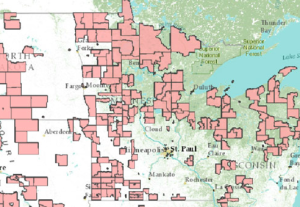I don’t understand why food deserts — areas in which it is difficult to buy affordable fresh food — happen. Why wouldn’t the free market law of supply-and-demand dictate that grocery stores would locate wherever food-consuming human beings are located? It’s especially difficult to understand how food deserts happen in densely populated urban neighborhoods.
 But food deserts definitely do happen, particularly in low-income and rural areas. When they do, Minnesota’s most vulnerable fellow citizens – those with the least economic ability to travel far distances to do their regular grocery shopping – suffer the most. Too often, they’re forced to eat what is available in their neighborhood, which is relatively expensive and unhealthy junk food from convenience stores and fast food restaurants.
But food deserts definitely do happen, particularly in low-income and rural areas. When they do, Minnesota’s most vulnerable fellow citizens – those with the least economic ability to travel far distances to do their regular grocery shopping – suffer the most. Too often, they’re forced to eat what is available in their neighborhood, which is relatively expensive and unhealthy junk food from convenience stores and fast food restaurants.
This phenomenon is contributing to an obesity epidemic in those neighborhoods that is threatening Minnesota’s quality-of-life, and driving huge medical costs. For the sake of our food desert-stranded neighbors and taxpayers who will bear much of the brunt of the resulting medical costs of these food deserts, something needs to be done.
So, what’s the solution? We normally can depend on market forces to solve resource allocation issues like this. But when market forces aren’t working, and the breakdown causes public problems and expenses, governments need to intervene.
This year, the Minnesota Legislature is considering establishing a Good Food Access program. Under the proposal, the Minnesota Department of Agriculture would provide $10 million per year for loans and grants to support or create grocery stores, or even mobile grocery stores.
Some may say that government supporting grocery stores is inappropriate. But clearly, the market is not working in this case, so government does need to fill in the gap to bring badly needed oases to Minnesota’s food deserts.

Thanks for bringing up this topic, and spreading the word about the program. It looks like the House sponsor is a Republican and the Senate sponsor is a Democrat — maybe we can look forward to other sensible bipartisan bills as well.